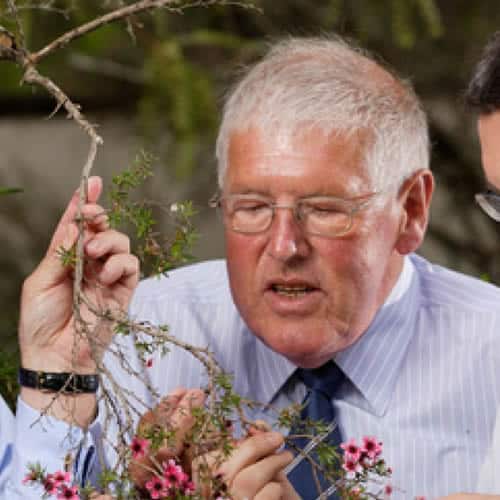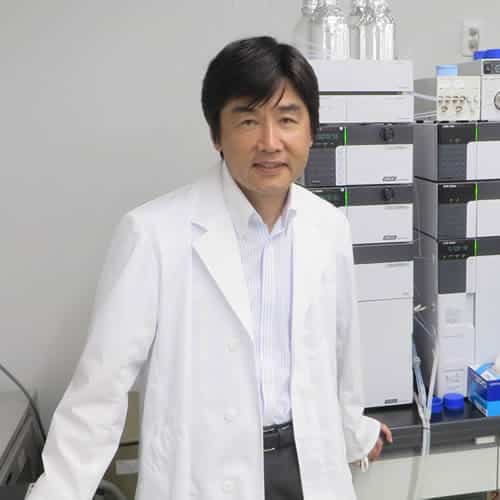PROFESSOR THOMAS HENLE
Technical University of Dresden – Germany
“A grading system must be scientifically sound, based on a method that has been published and can be used in laboratories. This is certainly the case for the MGO Manuka Honey classification”
Quote from Professor Thomas Henle – discoverer MGO – University of Dresden (Germany)
In 2006, Professor Thomas Henle of the Technical University of Dresden made a pivotal discovery: he demonstrated that Methylglyoxal (MGO) is the key compound responsible for the special bioactive effects of Manuka Honey. This discovery was a breakthrough in understanding why Manuka Honey is so unique compared to other types of honey.
Professor Henle’s Contributions to Manuka Honey Research:
-
Scientific Publications:
Since his groundbreaking discovery, Professor Henle has published numerous research papers on Manuka Honey and its bioactive properties, solidifying his role as one of the leading experts in this field. -
MGO and Bioactivity:
His work has proven that the high levels of MGO in Manuka Honey are directly responsible for its potent antibacterial and therapeutic effects, making it highly valued for its natural health benefits.
At MNZ, we follow the scientific principles laid out by researchers like Professor Henle to ensure that our Manuka Honey retains the bioactive properties that make it so exceptional. MGO is a key measure in determining the honey’s quality, and we are proud to offer products that reflect these high standards.

PROFESSOR PETER MOLAN
Waikato University – New Zealand
“Testing for Methylglyoxal is a clear and unambiguous way to let consumers know that the unique high-quality and natural bio-active effect of this honey is really, special and exclusively applicable to the MGO Manuka Honey.”
Quote from Professor Peter Molan – discoverer UMF – University of Waikato (New Zealand)
Since 1985, Professor Peter Molan of the University of Waikato has been at the forefront of research into the special effects of Manuka Honey. Working alongside the Waikato Honey Research Unit, Professor Molan’s work has been crucial in understanding the unique bioactivity of Manuka Honey, particularly in the medical field.
Key Contributions by Professor Peter Molan:
-
Discovery of UMF (Unique Manuka Factor):
Professor Molan coined the term UMF, which stands for Unique Manuka Factor, to describe the special bioactivity of Manuka Honey. His research showed that Manuka Honey has distinctive antibacterial and therapeutic properties, setting it apart from other types of honey. -
Research Focused on Health Benefits:
Professor Molan’s groundbreaking publications concentrated on Manuka Honey’s effectiveness in treating various medical conditions, including the treatment of foreign bacteria and wounds. His research demonstrated that Manuka Honey could be used as a natural remedy for wound healing and infection prevention. -
Early Suspicions of Manuka Honey’s Bioactivity:
Although Professor Molan had strong suspicions about the special effects of Manuka Honey, he and his team could not initially pinpoint the exact component responsible for its unique properties. The discovery of Methylglyoxal (MGO) later clarified the bioactive role of this compound in Manuka Honey, further confirming the findings of his research.
Legacy and Impact:
Professor Peter Molan’s pioneering work and scientific publications have left a lasting legacy in the study of Manuka Honey, making it one of the most researched and highly valued natural products in the world. His contributions, especially in the medical field, continue to influence the way we understand the therapeutic benefits of Manuka Honey.
At MNZ, we honor Professor Molan’s legacy by adhering to the rigorous standards and scientific principles he helped establish, ensuring that our Manuka Honey remains at the forefront of quality and bioactivity.

PROFESSOR KEIJI TERAO
Kobe University Medical School – Japan
Professor Keiji Terao, a renowned researcher, has made significant contributions to the development of natural antibacterial substances, including Manuka Honey. His work focused on enhancing the efficacy of natural compounds, including cyclodextrin-enhanced products designed to improve the antibacterial properties of substances like Manuka Honey and propolis.
Professor Terao’s Contributions:
-
Cyclodextrin-Enhanced Antibacterial Substances:
Professor Terao worked extensively on the development of cyclodextrin-enhanced products that could amplify the antibacterial effects of natural substances like Manuka Honey. This research aimed to create more effective antibacterial treatments and remedies derived from nature. -
Research on Propolis and Manuka Honey:
In addition to his work with cyclodextrin, Professor Terao also conducted research on propolis and Manuka Honey, both of which are known for their natural antimicrobial properties. His studies have helped to highlight the unique qualities of New Zealand’s Manuka Honey, further solidifying its position as a potent natural remedy.
Professor Terao’s research has played a pivotal role in advancing the scientific understanding of Manuka Honey’s natural bioactivity and its potential for use in medical and therapeutic applications. His contributions, alongside those of other scientists, continue to inform the production of high-quality, bioactive Manuka Honey. At MNZ, we proudly follow these scientific principles to ensure our honey remains a leader in natural health products.

DR. ROBERT LAHEIJ
Elisabeth-TweeSteden Hospital – The Netherlands
Dr. Robert Laheij is currently conducting important research into the therapeutic benefits of Manuka Honey for digestive health, particularly its supportive role for both the stomach and intestines. His work focuses on the potential of Manuka Honey to aid in various gastrointestinal conditions, leveraging its natural bioactive properties.
Key Areas of Research by Dr. Laheij:
-
Digestive Health Benefits:
Dr. Laheij’s research explores how Manuka Honey can support the digestive system, helping to alleviate issues related to the stomach and intestines. His studies are shedding light on how Manuka Honey’s natural bio-active properties may assist in promoting overall gut health. -
Support for Gastrointestinal Conditions:
Through his ongoing work, Dr. Laheij is investigating how Manuka Honey could serve as a natural support for conditions such as stomach ulcers, acid reflux, and intestinal inflammation, positioning it as a valuable part of a health-conscious approach to digestive care.
Dr. Laheij’s research underscores the growing scientific interest in Manuka Honey’s potential beyond its well-known bio-active properties, highlighting its role as a supportive product for digestive health. At MNZ, we remain committed to supporting such scientific advancements while providing authentic, high-quality Manuka Honey backed by ongoing research and development.

